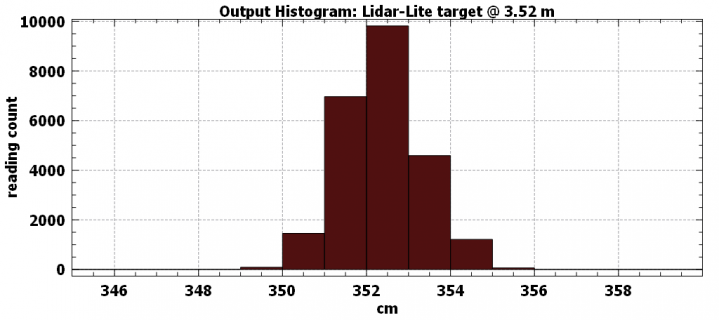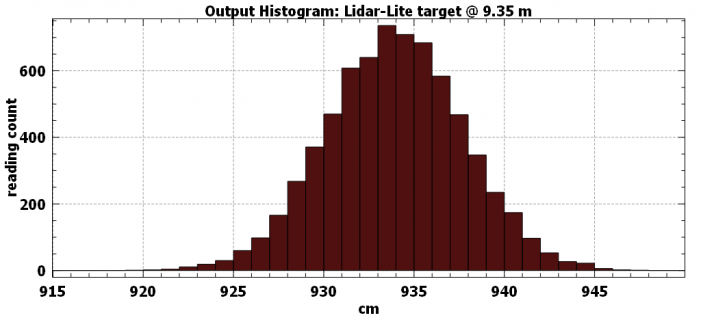/*
* TwoWire.h - TWI/I2C library for Arduino Due
* Copyright (c) 2011 Cristian Maglie <c.maglie@arduino.cc>
* All rights reserved.
*
* This library is free software; you can redistribute it and/or
* modify it under the terms of the GNU Lesser General Public
* License as published by the Free Software Foundation; either
* version 2.1 of the License, or (at your option) any later version.
*
* This library is distributed in the hope that it will be useful,
* but WITHOUT ANY WARRANTY; without even the implied warranty of
* MERCHANTABILITY or FITNESS FOR A PARTICULAR PURPOSE. See the GNU
* Lesser General Public License for more details.
*
* You should have received a copy of the GNU Lesser General Public
* License along with this library; if not, write to the Free Software
* Foundation, Inc., 51 Franklin St, Fifth Floor, Boston, MA 02110-1301 USA
*/
extern "C" {
#include <string.h>
}
#include "Wire.h"
static inline bool TWI_FailedAcknowledge(Twi *pTwi) {
return pTwi->TWI_SR & TWI_SR_NACK;
}
static inline bool TWI_WaitTransferComplete(Twi *_twi, uint32_t _timeout) {
uint32_t _status_reg = 0;
while ((_status_reg & TWI_SR_TXCOMP) != TWI_SR_TXCOMP) {
_status_reg = TWI_GetStatus(_twi);
if (_status_reg & TWI_SR_NACK)
return false;
if (--_timeout == 0)
return false;
}
return true;
}
static inline bool TWI_WaitByteSent(Twi *_twi, uint32_t _timeout) {
uint32_t _status_reg = 0;
while ((_status_reg & TWI_SR_TXRDY) != TWI_SR_TXRDY) {
_status_reg = TWI_GetStatus(_twi);
if (_status_reg & TWI_SR_NACK)
return false;
if (--_timeout == 0)
return false;
}
return true;
}
static inline bool TWI_WaitByteReceived(Twi *_twi, uint32_t _timeout) {
uint32_t _status_reg = 0;
while ((_status_reg & TWI_SR_RXRDY) != TWI_SR_RXRDY) {
_status_reg = TWI_GetStatus(_twi);
if (_status_reg & TWI_SR_NACK)
return false;
if (--_timeout == 0)
return false;
}
return true;
}
static inline bool TWI_STATUS_SVREAD(uint32_t status) {
return (status & TWI_SR_SVREAD) == TWI_SR_SVREAD;
}
static inline bool TWI_STATUS_SVACC(uint32_t status) {
return (status & TWI_SR_SVACC) == TWI_SR_SVACC;
}
static inline bool TWI_STATUS_GACC(uint32_t status) {
return (status & TWI_SR_GACC) == TWI_SR_GACC;
}
static inline bool TWI_STATUS_EOSACC(uint32_t status) {
return (status & TWI_SR_EOSACC) == TWI_SR_EOSACC;
}
static inline bool TWI_STATUS_NACK(uint32_t status) {
return (status & TWI_SR_NACK) == TWI_SR_NACK;
}
TwoWire::TwoWire(Twi *_twi, void(*_beginCb)(void)) :
twi(_twi), rxBufferIndex(0), rxBufferLength(0), txAddress(0),
txBufferLength(0), srvBufferIndex(0), srvBufferLength(0), status(
UNINITIALIZED), onBeginCallback(_beginCb), twiClock(TWI_CLOCK),RECV_TIMEOUT(100000), XMIT_TIMEOUT(100000) {
}
void TwoWire::begin(void) {
if (onBeginCallback)
onBeginCallback();
// Disable PDC channel
twi->TWI_PTCR = UART_PTCR_RXTDIS | UART_PTCR_TXTDIS;
TWI_ConfigureMaster(twi, twiClock, VARIANT_MCK);
status = MASTER_IDLE;
}
uint32_t TwoWire::getTxTimeOut(void) const
{
return this->XMIT_TIMEOUT;
}
uint32_t TwoWire::getRxTimeOut(void) const
{
return this->RECV_TIMEOUT;
}
void TwoWire::setTxTimeOut(uint32_t timeout_us)
{
this->XMIT_TIMEOUT = timeout_us;
}
void TwoWire::setRxTimeOut(uint32_t timeout_us)
{
this->RECV_TIMEOUT = timeout_us;
}
void TwoWire::begin(uint8_t address) {
if (onBeginCallback)
onBeginCallback();
// Disable PDC channel
twi->TWI_PTCR = UART_PTCR_RXTDIS | UART_PTCR_TXTDIS;
TWI_ConfigureSlave(twi, address);
status = SLAVE_IDLE;
TWI_EnableIt(twi, TWI_IER_SVACC);
//| TWI_IER_RXRDY | TWI_IER_TXRDY | TWI_IER_TXCOMP);
}
void TwoWire::begin(int address) {
begin((uint8_t) address);
}
void TwoWire::setClock(uint32_t frequency) {
twiClock = frequency;
TWI_SetClock(twi, twiClock, VARIANT_MCK);
}
uint8_t TwoWire::requestFrom(uint8_t address, uint8_t quantity, uint8_t sendStop) {
if (quantity > BUFFER_LENGTH)
quantity = BUFFER_LENGTH;
// perform blocking read into buffer
int readed = 0;
TWI_StartRead(twi, address, 0, 0);
do {
// Stop condition must be set during the reception of last byte
if (readed + 1 == quantity)
TWI_SendSTOPCondition( twi);
TWI_WaitByteReceived(twi, RECV_TIMEOUT);
rxBuffer[readed++] = TWI_ReadByte(twi);
} while (readed < quantity);
TWI_WaitTransferComplete(twi, RECV_TIMEOUT);
// set rx buffer iterator vars
rxBufferIndex = 0;
rxBufferLength = readed;
return readed;
}
uint8_t TwoWire::requestFrom(uint8_t address, uint8_t quantity) {
return requestFrom((uint8_t) address, (uint8_t) quantity, (uint8_t) true);
}
uint8_t TwoWire::requestFrom(int address, int quantity) {
return requestFrom((uint8_t) address, (uint8_t) quantity, (uint8_t) true);
}
uint8_t TwoWire::requestFrom(int address, int quantity, int sendStop) {
return requestFrom((uint8_t) address, (uint8_t) quantity, (uint8_t) sendStop);
}
void TwoWire::beginTransmission(uint8_t address) {
status = MASTER_SEND;
// save address of target and empty buffer
txAddress = address;
txBufferLength = 0;
}
void TwoWire::beginTransmission(int address) {
beginTransmission((uint8_t) address);
}
//
// Originally, 'endTransmission' was an f(void) function.
// It has been modified to take one parameter indicating
// whether or not a STOP should be performed on the bus.
// Calling endTransmission(false) allows a sketch to
// perform a repeated start.
//
// WARNING: Nothing in the library keeps track of whether
// the bus tenure has been properly ended with a STOP. It
// is very possible to leave the bus in a hung state if
// no call to endTransmission(true) is made. Some I2C
// devices will behave oddly if they do not see a STOP.
//
uint8_t TwoWire::endTransmission(uint8_t sendStop) {
uint8_t error = 0;
// transmit buffer (blocking)
TWI_StartWrite(twi, txAddress, 0, 0, txBuffer[0]);
if (!TWI_WaitByteSent(twi, XMIT_TIMEOUT))
error = 2; // error, got NACK on address transmit
if (error == 0) {
uint16_t sent = 1;
while (sent < txBufferLength) {
TWI_WriteByte(twi, txBuffer[sent++]);
if (!TWI_WaitByteSent(twi, XMIT_TIMEOUT))
error = 3; // error, got NACK during data transmmit
}
}
if (error == 0) {
TWI_Stop(twi);
if (!TWI_WaitTransferComplete(twi, XMIT_TIMEOUT))
error = 4; // error, finishing up
}
txBufferLength = 0; // empty buffer
status = MASTER_IDLE;
return error;
}
// This provides backwards compatibility with the original
// definition, and expected behaviour, of endTransmission
//
uint8_t TwoWire::endTransmission(void)
{
return endTransmission(true);
}
size_t TwoWire::write(uint8_t data) {
if (status == MASTER_SEND) {
if (txBufferLength >= BUFFER_LENGTH)
return 0;
txBuffer[txBufferLength++] = data;
return 1;
} else {
if (srvBufferLength >= BUFFER_LENGTH)
return 0;
srvBuffer[srvBufferLength++] = data;
return 1;
}
}
size_t TwoWire::write(const uint8_t *data, size_t quantity) {
if (status == MASTER_SEND) {
for (size_t i = 0; i < quantity; ++i) {
if (txBufferLength >= BUFFER_LENGTH)
return i;
txBuffer[txBufferLength++] = data[i];
}
} else {
for (size_t i = 0; i < quantity; ++i) {
if (srvBufferLength >= BUFFER_LENGTH)
return i;
srvBuffer[srvBufferLength++] = data[i];
}
}
return quantity;
}
int TwoWire::available(void) {
return rxBufferLength - rxBufferIndex;
}
int TwoWire::read(void) {
if (rxBufferIndex < rxBufferLength)
return rxBuffer[rxBufferIndex++];
return -1;
}
int TwoWire::peek(void) {
if (rxBufferIndex < rxBufferLength)
return rxBuffer[rxBufferIndex];
return -1;
}
void TwoWire::flush(void) {
// Do nothing, use endTransmission(..) to force
// data transfer.
}
void TwoWire::onReceive(void(*function)(int)) {
onReceiveCallback = function;
}
void TwoWire::onRequest(void(*function)(void)) {
onRequestCallback = function;
}
void TwoWire::onService(void) {
// Retrieve interrupt status
uint32_t sr = TWI_GetStatus(twi);
if (status == SLAVE_IDLE && TWI_STATUS_SVACC(sr)) {
TWI_DisableIt(twi, TWI_IDR_SVACC);
TWI_EnableIt(twi, TWI_IER_RXRDY | TWI_IER_GACC | TWI_IER_NACK
| TWI_IER_EOSACC | TWI_IER_SCL_WS | TWI_IER_TXCOMP);
srvBufferLength = 0;
srvBufferIndex = 0;
// Detect if we should go into RECV or SEND status
// SVREAD==1 means *master* reading -> SLAVE_SEND
if (!TWI_STATUS_SVREAD(sr)) {
status = SLAVE_RECV;
} else {
status = SLAVE_SEND;
// Alert calling program to generate a response ASAP
if (onRequestCallback)
onRequestCallback();
else
// create a default 1-byte response
write((uint8_t) 0);
}
}
if (status != SLAVE_IDLE) {
if (TWI_STATUS_TXCOMP(sr) && TWI_STATUS_EOSACC(sr)) {
if (status == SLAVE_RECV && onReceiveCallback) {
// Copy data into rxBuffer
// (allows to receive another packet while the
// user program reads actual data)
for (uint8_t i = 0; i < srvBufferLength; ++i)
rxBuffer[i] = srvBuffer[i];
rxBufferIndex = 0;
rxBufferLength = srvBufferLength;
// Alert calling program
onReceiveCallback( rxBufferLength);
}
// Transfer completed
TWI_EnableIt(twi, TWI_SR_SVACC);
TWI_DisableIt(twi, TWI_IDR_RXRDY | TWI_IDR_GACC | TWI_IDR_NACK
| TWI_IDR_EOSACC | TWI_IDR_SCL_WS | TWI_IER_TXCOMP);
status = SLAVE_IDLE;
}
}
if (status == SLAVE_RECV) {
if (TWI_STATUS_RXRDY(sr)) {
if (srvBufferLength < BUFFER_LENGTH)
srvBuffer[srvBufferLength++] = TWI_ReadByte(twi);
}
}
if (status == SLAVE_SEND) {
if (TWI_STATUS_TXRDY(sr) && !TWI_STATUS_NACK(sr)) {
uint8_t c = 'x';
if (srvBufferIndex < srvBufferLength)
c = srvBuffer[srvBufferIndex++];
TWI_WriteByte(twi, c);
}
}
}
#if WIRE_INTERFACES_COUNT > 0
static void Wire_Init(void) {
pmc_enable_periph_clk(WIRE_INTERFACE_ID);
PIO_Configure(
g_APinDescription[PIN_WIRE_SDA].pPort,
g_APinDescription[PIN_WIRE_SDA].ulPinType,
g_APinDescription[PIN_WIRE_SDA].ulPin,
g_APinDescription[PIN_WIRE_SDA].ulPinConfiguration);
PIO_Configure(
g_APinDescription[PIN_WIRE_SCL].pPort,
g_APinDescription[PIN_WIRE_SCL].ulPinType,
g_APinDescription[PIN_WIRE_SCL].ulPin,
g_APinDescription[PIN_WIRE_SCL].ulPinConfiguration);
NVIC_DisableIRQ(WIRE_ISR_ID);
NVIC_ClearPendingIRQ(WIRE_ISR_ID);
NVIC_SetPriority(WIRE_ISR_ID, 0);
NVIC_EnableIRQ(WIRE_ISR_ID);
}
TwoWire Wire = TwoWire(WIRE_INTERFACE, Wire_Init);
void WIRE_ISR_HANDLER(void) {
Wire.onService();
}
#endif
#if WIRE_INTERFACES_COUNT > 1
static void Wire1_Init(void) {
pmc_enable_periph_clk(WIRE1_INTERFACE_ID);
PIO_Configure(
g_APinDescription[PIN_WIRE1_SDA].pPort,
g_APinDescription[PIN_WIRE1_SDA].ulPinType,
g_APinDescription[PIN_WIRE1_SDA].ulPin,
g_APinDescription[PIN_WIRE1_SDA].ulPinConfiguration);
PIO_Configure(
g_APinDescription[PIN_WIRE1_SCL].pPort,
g_APinDescription[PIN_WIRE1_SCL].ulPinType,
g_APinDescription[PIN_WIRE1_SCL].ulPin,
g_APinDescription[PIN_WIRE1_SCL].ulPinConfiguration);
NVIC_DisableIRQ(WIRE1_ISR_ID);
NVIC_ClearPendingIRQ(WIRE1_ISR_ID);
NVIC_SetPriority(WIRE1_ISR_ID, 0);
NVIC_EnableIRQ(WIRE1_ISR_ID);
}
TwoWire Wire1 = TwoWire(WIRE1_INTERFACE, Wire1_Init);
void WIRE1_ISR_HANDLER(void) {
Wire1.onService();
}
#endif



